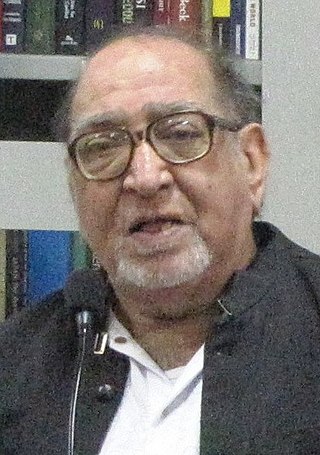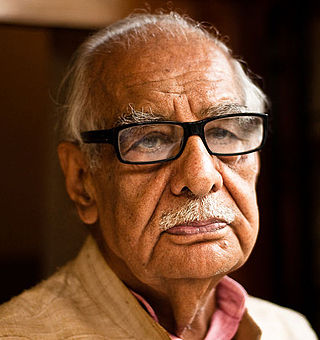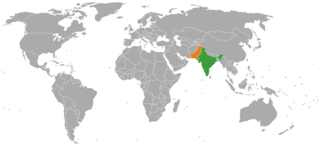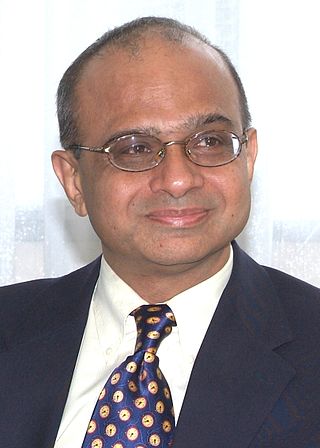
Nuclear disarmament is the act of reducing or eliminating nuclear weapons. Its end state can also be a nuclear-weapons-free world, in which nuclear weapons are completely eliminated. The term denuclearization is also used to describe the process leading to complete nuclear disarmament.

Since the Partition of British India in 1947 and subsequent creation of the dominions of India and Pakistan, the two countries have been involved in a number of wars, conflicts, and military standoffs. A long-running dispute over Kashmir and cross-border terrorism have been the predominant cause of conflict between the two states, with the exception of the Indo-Pakistani War of 1971, which occurred as a direct result of hostilities stemming from the Bangladesh Liberation War in erstwhile East Pakistan.

Asghar Ali Engineer was an Indian reformist writer and social activist. Internationally known for his work on liberation theology in Islam, he led the Progressive Dawoodi Bohra movement. The focus of his work was on communalism and communal and ethnic violence in India and South Asia. He was a votary of peace and non-violence and lectured all over world on communal harmony.

Kuldip Nayar was an Indian journalist, syndicated columnist, human rights activist, author and former High Commissioner of India to the United Kingdom noted for his long career as a left-wing political commentator. He was also nominated as a member of the upper house of the Indian Parliament in 1997.

John Dayal is an Indian human rights and Christian political activist. He is a member of the National Integration Council (NIC) of India, Secretary-General of the All India Christian Council and a past president of the All India Catholic Union. He has been outspoken in opposition to communal polarisation, bigotry and the spread of hatred between religious communities.
Balraj Puri (1928-2014) was an Indian Political commentator and human rights activist.

Communal violence is a form of violence that is perpetrated across ethnic or communal lines, where the violent parties feel solidarity for their respective groups and victims are chosen based upon group membership. The term includes conflicts, riots and other forms of violence between communities of different religious faith or ethnic origins.

Amitabh Mattoo is one of India's leading thinkers and writers on Modern and Contemporary History, Political science, International relations. He was awarded Padma Shri by the Government of India in 2009. He is Dean of the School of International Studies, Chair & professor at Jawaharlal Nehru University and honorary professor of international relations at the University of Melbourne. Until 19 June 2018, he served as Advisor to the Chief Minister of Jammu and Kashmir, with the status of a Cabinet Minister. Mattoo is a member of the Academic Advisory Board of the German Institute for Global and Area Studies and was recently elected unanimously as its Deputy Chair. He was the founding CEO of the Australia India Institute at the University of Melbourne and served as chairman of the governing board of Miranda House, University of Delhi, the highest-ranked women's college in India, and served as Chair of Kirori Mal College earlier He has also been a member of the Lancet Commission on Adolescent Health and Wellbeing. In 2002, he was the youngest person to be appointed as vice chancellor of a public university in independent India. Mattoo's advice on policy matters has been sought across political parties and across governments, including by Prime Ministers Atal Behari Vajpayee and Dr Manmohan Singh. Following the abrogation of Article 370 of the Constitution of India, he has offered a political roadmap for securing the future of Jammu and Kashmir. He has been a persistent advocate of multiculturalism and of reconciliation between Kashmiri Pandits and Kashmiri Muslims.
Amrita Basu is an American academic and political scientist. She currently is a professor at Amherst College where she holds affiliations in the departments of Political Science, Sexuality, Women's, & Gender Studies, Asian Languages & Civilizations, and Black Studies.
Anti-nuclear organizations may oppose uranium mining, nuclear power, and/or nuclear weapons. Anti-nuclear groups have undertaken public protests and acts of civil disobedience which have included occupations of nuclear plant sites. Some of the most influential groups in the anti-nuclear movement have had members who were elite scientists, including several Nobel Laureates and many nuclear physicists.
Praveen Swami is an Indian journalist and author specialising on international strategic and security issues. He is currently the Group Consulting Editor at Network18 Group. He was the Diplomatic Editor of The Daily Telegraph newspaper between September 2010 – October 2011, after which, he became the National Editor of The Indian Express newspaper from August 2014- January 2017. Swami is the author of two books on the India-Pakistan conflict in Kashmir. He was described by the BBC as "one of India's foremost experts of Islamist terrorism".
Harbans Mukhia is an Indian political historian whose principal area of study is medieval India.

United Nations Security Council resolution 1172, adopted unanimously on 6 June 1998, after hearing of nuclear tests conducted by India and Pakistan in May 1998, the Council condemned the tests and demanded that both countries refrain from engaging in further tests.
Project Devil was one of two early liquid-fueled missile projects developed by India, along with Project Valiant, in the 1970s. The goal of Project Devil was to produce a short-range surface-to-surface missile. Although discontinued in 1980 without achieving full success, Project Devil led to the later development of the Prithvi missile in the 1980s.
Project Valiant was one of two early liquid-fueled missile projects developed by India, along with Project Devil in the 1970s. The goal of Project Valiant was to produce an intercontinental ballistic missile. Although discontinued in 1974 without achieving success, Project Valiant, like Project Devil, led to the later development of the Prithvi missile in the 1980s.
Inquilabi Communist Sangathan was a Trotskyist organisation in India. Formed through the merger of the Communist League and the Bolshevik Leninist Group, it was set up in 1984. In the early years it had state units and members in ten provinces of India, and significant mass work. From the 1990s, there was a decline, partly because many of its members were unable to do serious teamwork; and partly because the dogmatic style of Magan Desai, a powerful figure in the strongest state unit, Gujarat, clashed with other members who wanted a more open and non-sectarian functioning. In addition, many ex-Stalinist and ex-Maoists were recruited, and one faction in West Bengal showed that they had simply replaced the Stalin-Mao cult by the Trotsky cult. By the end of the 1990s, the ICS was a much shrunken organisation. The final crisis came after the Gujarat carnage of 2002, when a faction around Desai attacked the most well-known anti-communal and civil rights activist members of the party as self-seeking individuals. The Conference of 2003 saw Gujarat, led by Desai, rejecting a delegate session, so it was unclear how many members were actually in ICS. The West Bengal unit, along with several Gujarat members, left. It is uncertain whether Desai had an actual majority with him, but he continued to call his rump organisation ICS. Their last public activity was a hostile intervention into the World Social Forum of Mumbai 2004. Those who had split subsequently set up an organisation, Radical Socialist.
Vidya Shankar Aiyar is an anti-nuclear weapons activist, an independent analyst of international relations and a media professional, formerly Executive Editor of CNN IBN.

The Transnational Institute(TNI), is an international non-profit research and advocacy think tank that was founded in 1974 in Amsterdam, Netherlands. According to their website, the organization promotes a "... just, democratic and sustainable world."

Brahma Chellaney is an Indian geostrategist and columnist. He is a professor of strategic studies at the Centre for Policy Research in New Delhi. He was a member of India's National Security Advisory Board and an author of its draft nuclear doctrine. He is a regular columnist for Project Syndicate, and writes for numerous other international publications.










